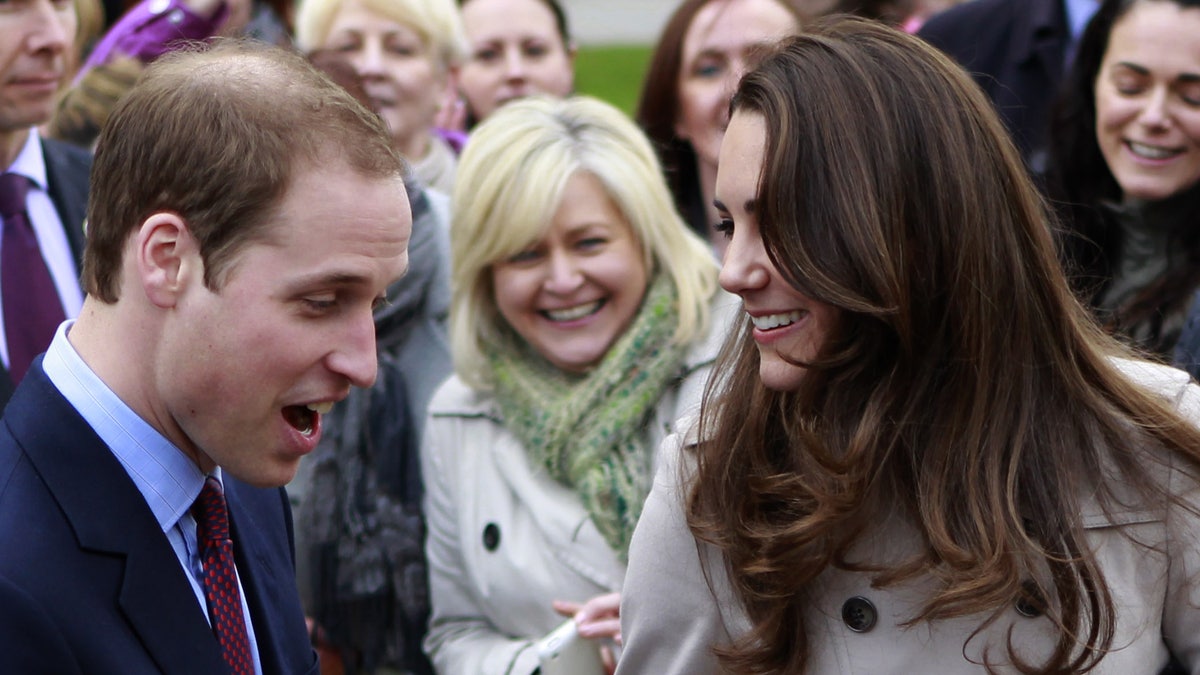
In this Tuesday, March 8, 2011 file photo, Britain's Prince William and Kate Middleton prepare to flip pancake at a display by the charity Northern Ireland Cancer Fund for Children outside the City Hall in Belfast, Northern Ireland. (AP2011)
Americans impressed by security preparations for the upcoming royal wedding may be surprised to know it would be difficult to implement many of those precautions here in the U.S.
“There’s a more mature acceptance in the U.K. of the tradeoff between civil liberties and security,” former CIA agent Mike Baker told FoxNews.com. “They went through homegrown terror issues with the IRA and they were bombed in WWII , and it developed an attitude that you don’t find here.”
Baker said Americans might be more security-sensitive “right after an incident like 9/11,” but it’s not too long before people start to complain “about having to take their shoes off at the airport.”
British authorities prepping for the nuptials of Prince William and Kate Middleton say they will likely use random stop-and-searches, closely monitored closed-circuit cameras spread throughout London and “pre-emptive policing,” which means police can arrest someone for a terror charge -- even planning or inciting a terror act -- before they have all the evidence related to it, to enforce order and maintain safety. Those “pre-charge” detentions can be based on a range of spying methods including phone taps, electronic surveillance and old-fashioned snooping.
Even the uploading of photos to a new iPhone app is being restricted within the vicinity Westminster Abbey and Buckingham Palace on the wedding day.
Baker, founder of the global intelligence and security firm Diligence, said that would be the biggest point of contention in the United States.
The application, which automatically uploads photos to the web and groups them according to where they were taken, has been labeled a “threat to security” by London police, who have banned its use in the vicinity of the wedding. The police say they will be monitoring use of the application on the wedding day and arrest anyone caught uploading unauthorized images.
Baker said that wouldn’t fly in the U.S. “You’re going to tell them what they can and can’t do with their iPhone? That would drive people nuts.”
Retired NYPD Detective Pat Brosnan said the extension of stop-and-search powers would also be far more difficult.
“The U.K. has the ability and authority to turn on like a light switch and turn off like a light switch the stop and search powers of their police authorities,” Brosnan, now founder and president of the Brosnan Group, told FoxNews.com. He said there are certain circumstances in the U.S. where police can set up perimeters and allow access only to those who submit to searches. But even those police powers are limited.
“In Times Square you can pen everybody in on New Year’s Eve and search their bags and maybe give them a quick patdown, but you wouldn’t be able to do a body search. That’s still not allowed without probable cause.”
The same, he said, goes for “pre-emptive policing.”
“They’re diminishing an established threshold for an arrest and suspending it for the sole purpose of facilitating security for an event. That would never fly here in a million years,” Brosnan said.
One thing that does “fly” in the U.S. is closed-circuit TV, which Brosnan says is already used by law enforcement in several U.S. cities. But Baker says it doesn’t come close to the surveillance in London.
“It’s nothing like them in terms of the coverage. I could pick someone up on the street in London and track them pretty much wherever they go. It’s a very impressive capability, and we’re nowhere near that.”
Baker said the main difference between U.S. and U.K. security isn’t necessarily what is done, but how it’s portrayed.
“We’re not necessarily as bold about describing things, and we have a few more hurdles,” Baker said. “But our goals are still the same: to control the perimeter, control the interior, make sure we understand the crowd and movement, do all surveillance ahead of time and make sure we collect evidence to identify the potential targets and lock them down.”
Former Assistant Director of the FBI Bill Gavin, of the Gavin Group, said President Obama’s inauguration is a perfect example. “We pretty much shut down Washington, D.C. We prohibit a lot of things.”
But the men agreed that the law enforcement community in the United States still need more authority to keep the country safe.
“There’s a number of different measures that should be implemented in the face of the reality that we now have. Our biggest threat is homegrown extremism,” Brosnan said. “How do you get control of that? It’s tough, very tough, and people have forgotten.”
